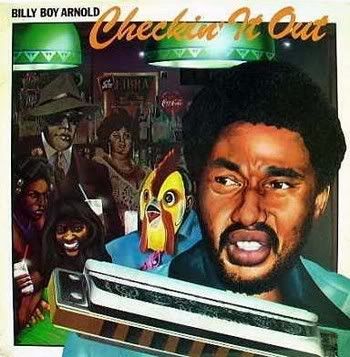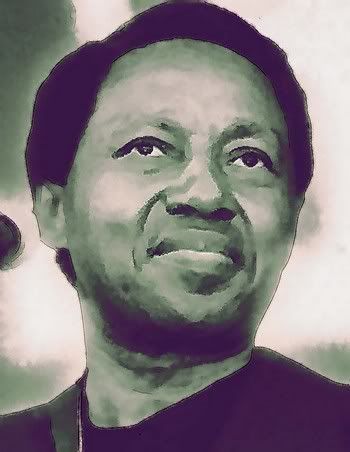
Billy Boy Arnold - Checkin' It Out - 1979 - Red Lightnin'
A quote from Billy Boy Arnold describing what the blues meant to him - "The blues, as a music that covers all spectrums of all people, 'cause everybody at one time has had the blues, whether you're black, white, or whatever. If you get a pink slip tomorrow and you were planning on getting married in a few months and had this great job, you got the blues, right? If your best girl call you up and say, well, I think I like this other guy better, you got the blues, man, she's floored you, you go and get you a drink and listen to the blues. If you don't even listen to the blues, you have the blues. That's why the blues is so worldwide in appeal, because any time people have had any kind of suffering or oppression in any shape form, whether it's slavery or war or whatever, they have had the blues. That's why I think the Europe embrace the blues so strongly, because they went through a lot of hardship during the wars over there. So they know what the blues is. They like the blues in Japan, they had the blues too".
Billy Boy Arnold is an integral part of Chicago's blues history. During the 1940's, the great Sonny Boy Williamson taught Arnold the harmonica. In 1977 Billy Boy Arnold recorded this great album. It was produced by Pete Shertser at London's Pathway Studios, and the whole album was completed in just two days. Arnold was assisted on the recording by the Groundhogs' Tony McPhee, and Alan Fish. The late Wilgar Campbell, a drummer from a band called Terraplane also joined in on the recording session. Terraplane was one of the many bands that Tony McPhee played with occasionally in the late 70's, and early 80's. Black Echoes voted the album Blues LP of the Year. Although this LP was originally listed as a Billy Boy Arnold recording, Tony McPhee's influence is immense. Whenever he plays one of his blistering solos the album explodes into overdrive. This album has dozens of variations. It was originally released as a 12 track vinyl LP in 1979 on Red Lightnin' Records (see track listing). It was also released in 1980 on Rockhouse Records, with the track "Dirty Mother Fuyer" re-titled "Dirty Mother Fuc*er". It was released on CD in 1996 on Sequel Records, as "Checkin' It Out with Tony McPhee & the Groundhogs - The 1977 London Sessions". This album supposedly has all the tracks on all the original vinyl releases. The album has also been released as ""Catfish" by Billy Boy Arnold. This album contains many extra tracks. To bore you further, the album was also released on CD in 2007 on Red Lightnin', with the title "Dirty Mother" by Billy Boy Arnold Tony McPhee & the Groundhogs. Most of these releases contain the original twelve tracks from the 1979 Red Lightnin' album, and many releases have extra tracks from the original 1977 sessions included. The additional tracks 13 - 15 from the "Dirty Mother" release are included here. Check out Billy Boy Arnold's "More Blues From The South Side" album. There is info on his "Ten Million Dollars" album @ BBA/10MD Use p/w bluestown. You can find The Groundhogs "Hoggin' the Stage" album @ GHOGS/HTS and Tony McPhee's "Foolish Pride" album @ TMCP/FP Can anybody supply a definitive list of tracks from the original 1977 sessions?
TRACKS / COMPOSERS [ N.B - Tracks 1-12 are from the original 1979 Red Lightnin' LP release ]
1 Dirty Mother Fuyer - [Renamed "Dirty Mother Fuc*er" on 1980 Rockhouse LP release] - Trad. Arr. W.Arnold
2 Don't Stay Out All Night - W.Arnold
3 1-2-99 - Hawkins
4 Riding The El - W.Arnold
5 Just Got To Know - McCracklin/Geddins
6 Christmas Time - McCracklin/Geddins
7 I Wish You Would - W.Arnold
8 Ah'w Baby - W.Jacobs
9 Sweet Miss Bea - W.Arnold
10 Blue And Lonesome - Carter
11 Eldorado Cadillac - W.Arnold
12 Mary Bernice - W.Arnold
13 It's Great To Be Rich - Track is on the 2007 CD, "Dirty Mother" by Billy Boy Arnold Tony McPhee & the Groundhogs, not on original 1979 Red Lightnin' LP release - Unknown
14 Just A Dream - Track is on the 2007 CD, "Dirty Mother" by Billy Boy Arnold Tony McPhee & the Groundhogs, not on original 1979 Red Lightnin' LP release - W.Broonzy
15 Catfish - Track is on the 2007 CD, "Dirty Mother" by Billy Boy Arnold Tony McPhee & the Groundhogs, not on original 1979 Red Lightnin' LP release - Petway
MUSICIANS
Billy Boy Arnold - Vocals, Harmonica
Tony McPhee - Guitar
Alan Fish - Bass
Wilgar Campbell - Drums

BILLY BOY ARNOLD (BIO)
Talk about a comeback. After too many years away from the studio, Chicago harpist Billy Boy Arnold returned to action in a big way with two fine albums for Alligator: 1993's Back Where I Belong and 1995's Eldorado Cadillac. Retaining his youthful demeanor despite more than four decades of blues experience, Arnold's wailing harp and sturdy vocals remained in top-flight shape following the lengthy recording layoff. Born in Chicago rather than in Mississippi (as many of his musical forefathers were), young Arnold gravitated right to the source in 1948. He summoned up the courage to knock on the front door of his idol, harmonica great John Lee "Sonny Boy" Williamson, who resided nearby. Sonny Boy kindly gave the lad a couple of harp lessons, but their relationship was quickly severed when Williamson was tragically murdered. Still in his teens, Arnold cut his debut 78 for the extremely obscure Cool logo in 1952. "Hello Stranger" went nowhere but gave him his nickname when its label unexpectedly read "Billy Boy Arnold." Arnold made an auspicious connection when he joined forces with Bo Diddley and played on the shave-and-a-haircut beat specialist's two-sided 1955 debut smash "Bo Diddley"/"I'm a Man" for Checker. That led, in a roundabout way, to Billy Boy's signing with rival Vee-Jay Records (the harpist mistakenly believed Leonard Chess didn't like him). Arnold's "I Wish You Would," utilizing that familiar Bo Diddley beat, sold well and inspired a later famous cover by the Yardbirds. That renowned British blues-rock group also took a liking to another Arnold classic on Vee-Jay, "I Ain't Got You." Other Vee-Jay standouts by Arnold included "Prisoner's Plea" and "Rockinitis," but by 1958, his tenure at the label was over. Other than an excellent Samuel Charters-produced 1963 album for Prestige, More Blues on the South Side, Arnold's profile diminished over the years in his hometown (though European audiences enjoyed him regularly) and he first ended up driving a bus in his hometown of Chicago, then working as a parole officer for the state of Illinois. Fortunately, that changed: Back Where I Belong restored this Chicago harp master to prominence, and Eldorado Cadillac drove him into the winner's circle a second time. After a six year lull between recordings, 2001's Boogie 'n' Shuffle on Stony Plain found Arnold still in fine form, backed by Duke Robillard and his band on a set of rough and ready blues. © Bill Dahl, allmusic.com
BIO (GROUNDHOGS)
The Groundhogs were not British blues at their most creative; nor were they British blues at their most generic. They were emblematic of some of the genre's most visible strengths and weaknesses. They were prone to jam too long on basic riffs, they couldn't hold a candle to American blues singers in terms of vocal presence, and their songwriting wasn't so hot. On the other hand, they did sometimes stretch the form in unexpected ways, usually at the hands of their creative force, guitarist/songwriter/vocalist T.S. (Tony) McPhee. For a while they were also extremely popular in Britain, landing three albums in that country's Top Ten in the early '70s. The Groundhogs' roots actually stretch back to the mid-'60s, when McPhee helped form the group, named after a John Lee Hooker song (the band was also known briefly as John Lee's Groundhogs). In fact, the Groundhogs would back Hooker himself on some of the blues singer's mid-'60s British shows, and also back him on record on an obscure LP. They also recorded a few very obscure singles with a much more prominent R&B/soul influence than their later work. In 1966, the Groundhogs evolved into Herbal Mixture, which (as if you couldn't guess from the name) had more of a psychedelic flavor than a blues one. Their sole single, "Machines," would actually appear on psychedelic rarity compilations decades later. The Groundhogs/Herbal Mixture singles, along with some unreleased material, has been compiled on a reissue CD on Distortions. After Herbal Mixture folded, McPhee had a stint with the John Dummer Blues Band before reforming the Groundhogs in the late '60s at the instigation of United Artists A&R man Andrew Lauder. Initially a quartet (bassist Pete Cruickshank also remained from the original Groundhogs lineup), they'd stripped down to a trio by the time of their commercial breakthrough, Thank Christ for the Bomb, which made the U.K. Top Ten in 1970. The Groundhogs' power-trio setup, as well as McPhee's vaguely Jack Bruce-like vocals, bore a passing resemblance to the sound pioneered by Cream. They were blunter and less inventive than Cream, but often strained against the limitations of conventional 12-bar blues with twisting riffs and unexpected grinding chord changes. McPhee's lyrics, particularly on Thank Christ for the Bomb, were murky, sullen anti-establishment statements that were often difficult to decipher, both in meaning and actual content. They played it straighter on the less sophisticated follow-up, Split, which succumbed to some of the period's blues-hard-rock indulgences, putting riffs and flash over substance. McPhee was always at the very least an impressive guitarist, and a very versatile one, accomplished in electric, acoustic, and slide styles. Who Will Save the World? The Mighty Groundhogs! (1972), their last Top Ten entry, saw McPhee straying further from blues territory into somewhat progressive realms, even adding some mellotron and harmonium (though the results were not wholly unsuccessful). The Groundhogs never became well-known in the U.S., where somewhat similar groups like Ten Years After were much bigger. Although McPhee and the band have meant little in commercial or critical terms in their native country since the early '70s, they've remained active as a touring and recording unit since then, playing to a small following in the U.K. and Europe. © Richie Unterberger, allmusic.com





1 comment:
LINK Pt 1
LINK Pt 2
Post a Comment